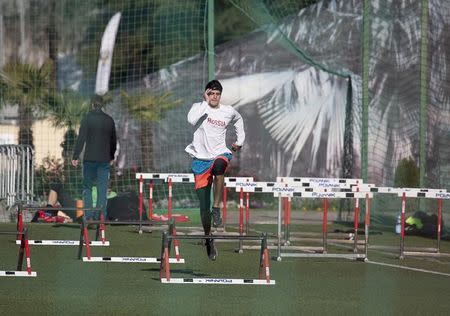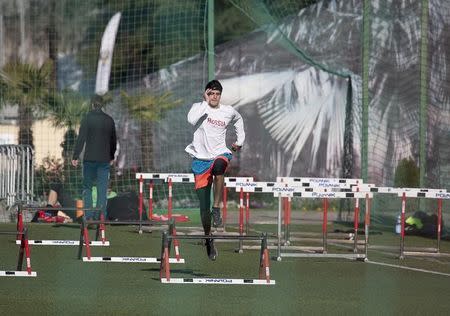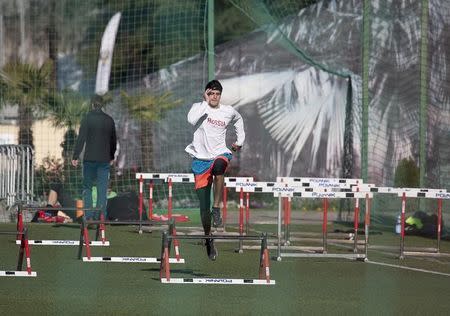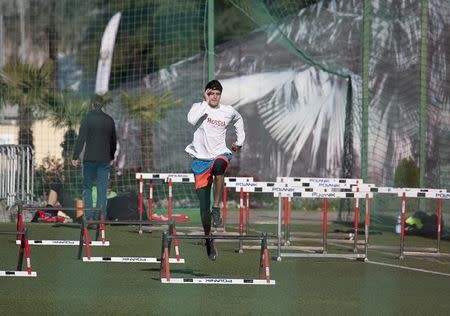Russia proposes its athletes compete under Russian Olympic flag to evade ban
By Maria Kiselyova
MOSCOW (Reuters) - Russia said on Sunday it would ask the world athletics body to allow its athletes to compete under an Olympic banner rather than the Russian flag to circumvent a ban, but the idea was quickly brushed aside by the International Olympic Committee.
The International Association of Athletics Federations (IAAF) suspended the Russian Athletics Federation (ARAF) on Friday following allegations of widespread and state-sponsored doping.
Russia has since announced a three-month road map to clean up its act, with the nation's Olympic Committee leading efforts to ensure honest athletes can compete at the 2016 Olympics.
Sports Minister Vitaly Mutko said his ministry would ask the Russian Olympics Committee (ROC) to apply to the IAAF and the International Olympics Committee (IOC) to request that Russian athletes compete under an ROC flag.
"I hope the IAAF will consider our application that over the next three months while the membership of the Russian Athletics Federation is suspended, our athletes could compete in international contests under the flag of the ROC, our national Olympic Committee," he told a news conference.
Some Russian athletes have already suggested they could compete at the 2016 Olympics as independents under the Olympic flag.
The IOC has previously allow independents to compete at Olympic Games in certain cases, such as when an athlete's home country is in transition or subject to sanctions.
But asked on Sunday if Russian athletes could possibly compete under the Olympic flag, IOC President Thomas Bach said: "This is total speculation, I cannot see this situation occurring at this moment."
Bach said on Saturday that he was sure clean Russian athletes would compete at the 2016 Games. The first competition to be affected by the ban will be the European cross-country championships in France in December.
The IAAF said priority for both the governing body and Russia was to make ARAF "compliant with the IAAF".
"Our job right now is to focus on the work that needs to be done to make ARAF compliant with the IAAF and, together with WADA, compliant for re-entry into international competition," the IAAF said in a statement.
"Everyone within the IAAF will work tirelessly with authorities in Russia on the reinstatement of ARAF as soon as possible as this is the best outcome for the athletes. This is the first and only priority right now for the IAAF and for Russia."
Mutko spoke after attending an extraordinary meeting of the board of the Russian Athletics Federation.
ARAF's acting head, Vadim Zelichenok, told the news conference he hoped Russia would be restored in the IAAF within three months.
Meanwhile, a new committee would work closely with the IAAF to address the World Anti-Doping Agency's (WADA) allegations that led to the ban, he said.
Zelichenok also said ARAF's board would hold early elections on Jan. 16 for a new president and vice presidents.
DIVERT ATTENTION
Zelichenok said earlier on Sunday that the IAAF was punishing Russia to divert attention from its own failings.
"We understand that the publication of the second part of the WADA report will deal a serious blow to the IAAF. This partially explains such a tough decision with regard to Russia's Athletics Federation," Zelichenok was quoted as saying by state-run newswire R-Sport agency.
Former IAAF president Lamine Diack is being investigated by French police over allegations he received bribes to cover up positive doping tests of Russian athletes.
The commission has so far withheld other aspects of the IAAF's actions regarding Russia as they form part of an investigation by Interpol into international corruption involving officials and athletes.
(Additional reporting by Karolos Grohmann in BERLIN; Editing by Raissa Kasolowsky and Alan Crosby)









